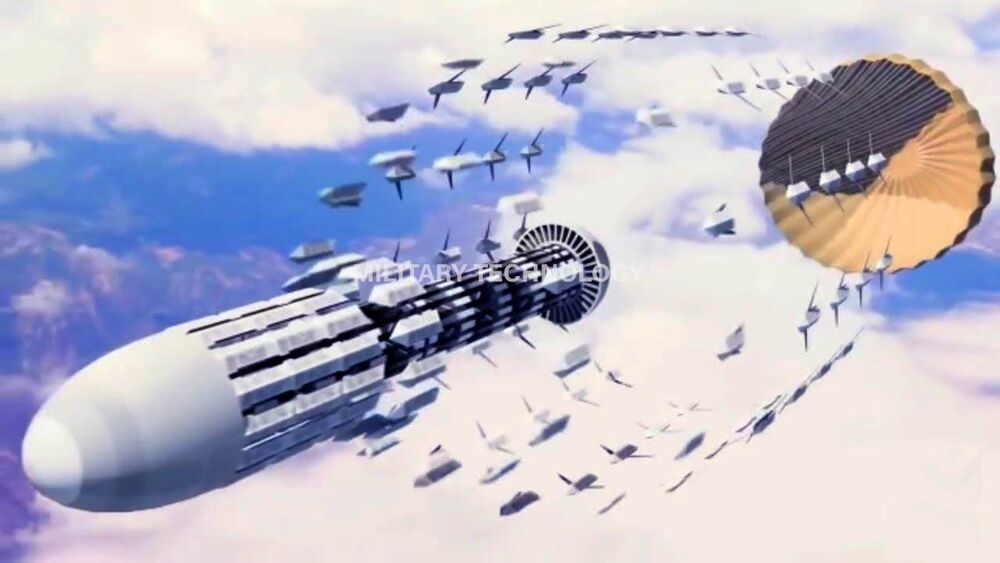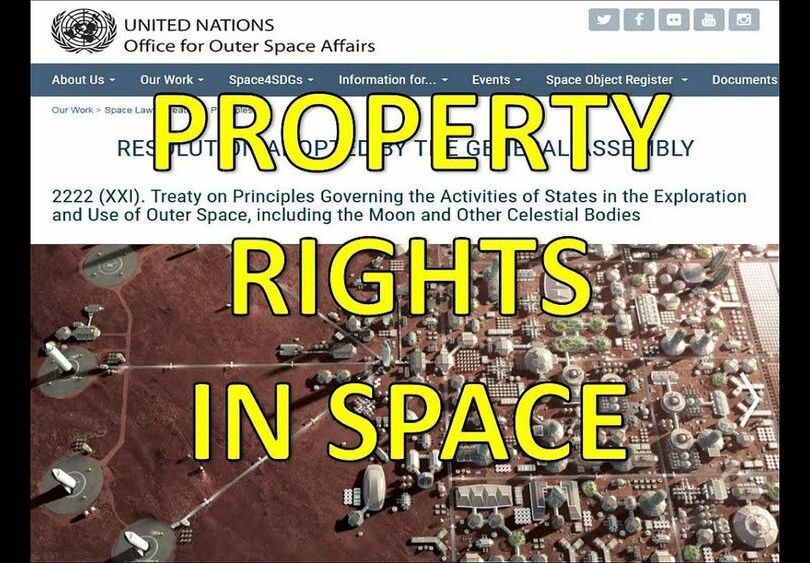May 26, 2021
How to Avoid a Cosmic Catastrophe
Posted by Mishari Al Hasawi in categories: geopolitics, space travel, treaties
An interstellar treaty with other advanced civilizations could stave off death by domain wall.
An interstellar treaty with other advanced civilizations could stave off death by domain wall.

https://youtube.com/watch?v=KLmmPnMvwNY
‘Weapon of Mass Destruction’ is a term used in arms-control circles signifying something capable of damage on a large scale and subject to international treaties. Analyst Zak Kallenborn argues in a recent study for the U.S. Air Force Center for Strategic Deterrence Studies that some types of drone swarm would count as WMD. The argument might seem like the theoretical arms control equivalent of angels dancing on the head of a pin — except that the U.S. Army is working on a lethal swarm which fits Kallenborn’s description. Watch the video for more: https://youtu.be/KLmmPnMvwNY
The massive THANKS YOU to everyone for watching and all of your support!
Continue reading “U.S. Army Announced New Drone Swarm Would Be A Weapon Of Mass Destruction” »
There’s an additional reason why international agreement and co-operation in the outer space domain is crucial: the peaceful use of outer space, as required by the Outer Space Treaty.
In October 2020, eight countries signed a NASA-led initiative called the Artemis Accords. These included the United States, Canada, Australia and Luxembourg. Notably absent were Russia and China, who have since agreed to collaborate with each other on space initiatives.
Legal issues about the ownership of space resources must urgently be addressed to avoid space wars over natural resources between superpowers like the U.S., Russia and China. This includes the legal status of the Artemis Accords. Ideally, it should be done before space mining starts.
The Treaty on the Prohibition of Nuclear Weapons represents a refusal to live forever under this nuclear shadow. It reflects a belief that the status quo represents a grave inequity, in which nuclear costs are imposed upon all, while the benefits of nuclear arms accrue to the few states privileged to possess them.

Property rights of some type are needed in space to establish reliable operations based there, Yet the 1967 Outer Space Treaty is a huge challenge to this. See the countries that did not sign the 1967 outer space treaty, Credit to the L5 Society for stopping the moon treaty, See an introductory talk on what we can do about this. Also see that Asgardia was NOT the first space nation!
You can support Galactic Gregs by supporting the sister channel Green Gregs by clicking the links below:
See the Special Deals at My Patriot Supply (great space mission food): www.PrepWithGreg.com.
For gardening in your space habitat (or on Earth) Galactic Gregs has teamed up with True Leaf Market to bring you a great selection of seed for your planting. Check it out: http://www.pntrac.com/t/TUJGRklGSkJGTU1IS0hCRkpIRk1K
“Especially during times of tension, verifiable limits on Russia’s intercontinental-range nuclear weapons are vitally important,” Secretary of State Antony Blinken said.
Tokyo, Jan. 21 (Jiji Press)—The U.N. treaty to ban the production, possession and use of nuclear weapons has started taking effect in countries that ratified it by October last year.
Among the 50 signatories, Kiribati and other island countries in the South Pacific became the first to see the nuclear weapons ban treaty coming into force on Friday, the day of effectuation in respective time zones.
The landmark international treaty was adopted in 2017 with support from 122 nations and regions at the initiative of nonnuclear weapons states frustrated with long-stalled disarmament talks. It met the requirement of having 50 member states as Honduras ratified it in late October.
COSPAR’s Planetary Protection Policy ensures scientific investigations related to the origin and distribution of life are not compromised.
Protecting the Earth from alien life sounds like the latest plot for a blockbuster thriller set in outer space. Whether it’s an invasion or a mysterious alien illness, the extraterrestrial threat to our planet has been well-explored in science fiction. But protecting the Earth from extraterrestrial contamination is not just a concept for our entertainment; as we explore further across our solar system and begin to land on our neighbouring planetary bodies, ensuring that we don’t bring potentially dangerous material home to Earth or indeed carry anything from Earth that may contaminate another planet is a responsibility we must take seriously.
So, who is responsible for ensuring that our space exploration is completed safely? Many nations around the world have their own space agencies, such as NASA and the European Space Agency, who run many different types of missions to explore space. States are responsible for their space activities under the Outer Space Treaty of 1967, including governmental and non-governmental actors. The Outer Space Treaty, among several provisions, regulates in its Article IX against harmful contamination. One of the core activities of the Committee on Space Research (COSPAR) is to develop, maintain, and promote a Policy on Planetary Protection, as the only international reference standard for spacefaring nations and in guiding compliance with Article IX of the Outer Space Treaty.
In October, the Treaty on the Prohibition of Nuclear Weapons (TPNW) reached the 50 ratifications needed to become international law. Beatrice Fihn and Daniel Högsta look at how European governments can use the TPNW to advance nuclear disarmament.
There is some precedent for international treaties regarding the exploration of other worlds, most-notably the Outer Space Treaty of 1976 or the Artemis Accords. But these amount to little more than non-aggression pacts. The COSPAR convention came closer to what is needed by declaring the inherent hazards to science and terrestrial life that go with exploring other worlds. However, at present, such documents merely recommendations to governments and industry. There are no current means for enforcing the guidelines.
Elon Musk, the founder of SpaceX, talks with Commercial Crew astronauts and the current NASA Administrator, Jim Bridenstine. The merger between the public and private sectors of the aerospace industry is seen clearly with the partnership between NASA and SpaceX, as it was the first private company to bring American astronauts to the International Space Station.